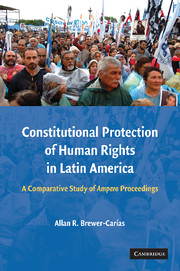 Constitutional Protection of Human Rights in Latin America
Constitutional Protection of Human Rights in Latin America Book contents
- Frontmatter
- Contents
- INTRODUCTION
- PART ONE THE CONSTITUTIONAL AND INTERNATIONAL DECLARATION OF HUMAN RIGHTS AND ITS JUDICIAL GUARANTIES
- PART TWO THE AMPARO AS A LATIN AMERICAN CONSTITUTIONAL AND INTERNATIONAL LAW INSTITUTION
- PART THREE THE INJURED PARTY AND THE CONSTITUTIONAL RIGHTS PROTECTED BY MEANS OF THE AMPARO PROCEEDING
- PART FOUR THE INJURY, THE INJURING PARTY AND THE INJURING ACTS OR OMISSIONS IN THE AMPARO PROCEEDING
- PART FIVE THE EXTRAORDINARY CHARACTER OF THE AMPARO PROCEEDING
- Chapter Seventeen The Question of the Admissibility of the Amparo Action and Its Relation with the Ordinary Judicial Means
- Chapter Eighteen The Main Principles of the Procedure in the Amparo Proceeding
- Chapter Nineteen The Configuration of the Main Phases of the Amparo Proceeding
- Chapter Twenty The Adjudication in the Amparo Proceeding and the Preliminary Protective Measures
- Chapter Twenty-One The Definitive Judicial Adjudication in the Amparo Suit
- Chapter Twenty-Two The Revision of the Amparo Decisions by the Constitutional Court or the Supreme Court
- CONCLUSION
- APPENDIX A List of Latin American Constitutions
- APPENDIX B List of Latin American Amparo Laws (Statutes)
- INDEX
Chapter Seventeen - The Question of the Admissibility of the Amparo Action and Its Relation with the Ordinary Judicial Means
Published online by Cambridge University Press: 08 August 2009
- Frontmatter
- Contents
- INTRODUCTION
- PART ONE THE CONSTITUTIONAL AND INTERNATIONAL DECLARATION OF HUMAN RIGHTS AND ITS JUDICIAL GUARANTIES
- PART TWO THE AMPARO AS A LATIN AMERICAN CONSTITUTIONAL AND INTERNATIONAL LAW INSTITUTION
- PART THREE THE INJURED PARTY AND THE CONSTITUTIONAL RIGHTS PROTECTED BY MEANS OF THE AMPARO PROCEEDING
- PART FOUR THE INJURY, THE INJURING PARTY AND THE INJURING ACTS OR OMISSIONS IN THE AMPARO PROCEEDING
- PART FIVE THE EXTRAORDINARY CHARACTER OF THE AMPARO PROCEEDING
- Chapter Seventeen The Question of the Admissibility of the Amparo Action and Its Relation with the Ordinary Judicial Means
- Chapter Eighteen The Main Principles of the Procedure in the Amparo Proceeding
- Chapter Nineteen The Configuration of the Main Phases of the Amparo Proceeding
- Chapter Twenty The Adjudication in the Amparo Proceeding and the Preliminary Protective Measures
- Chapter Twenty-One The Definitive Judicial Adjudication in the Amparo Suit
- Chapter Twenty-Two The Revision of the Amparo Decisions by the Constitutional Court or the Supreme Court
- CONCLUSION
- APPENDIX A List of Latin American Constitutions
- APPENDIX B List of Latin American Amparo Laws (Statutes)
- INDEX
Summary
The first question refers to the adjective rules of the admissibility of the amparo action derived from the relation that exists between the amparo action as an extraordinary judicial mean and the other ordinary judicial means.
In this context, the general rule of admissibility refers to two aspects: first, that the amparo action can only be admissible when there are no other judicial means for granting the constitutional protection; and second, that when the legal order provides for these other judicial means for protection of the right, they are inadequate in order to obtain the immediate protection of the harmed or threatened constitutional rights. In a contrary sense, the amparo action is inadmissible for the protection of a constitutional right if the legal order provides for other actions or proceedings that are adequate for such purpose, guarantying immediate protection to the right.
This rule of admissibility of the amparo action is similar to the general rule existing in the United States regarding the injunctions and all other equitable remedies, like the mandamus and prohibitions, all reserved for extraordinary cases, in the sense that they are available only “after the applicant shows that the legal remedies are inadequate.”
This rule always imposes the need for the plaintiff and for the court to determine in each case, not only the existence and availability of ordinary judicial means for obtaining the constitutional protection, but also the adequacy of such existing and available recourses for granting the immediate constitutional protection to the constitutional right.
- Type
- Chapter
- Information
- Constitutional Protection of Human Rights in Latin AmericaA Comparative Study of Amparo Proceedings, pp. 331 - 345Publisher: Cambridge University PressPrint publication year: 2008


